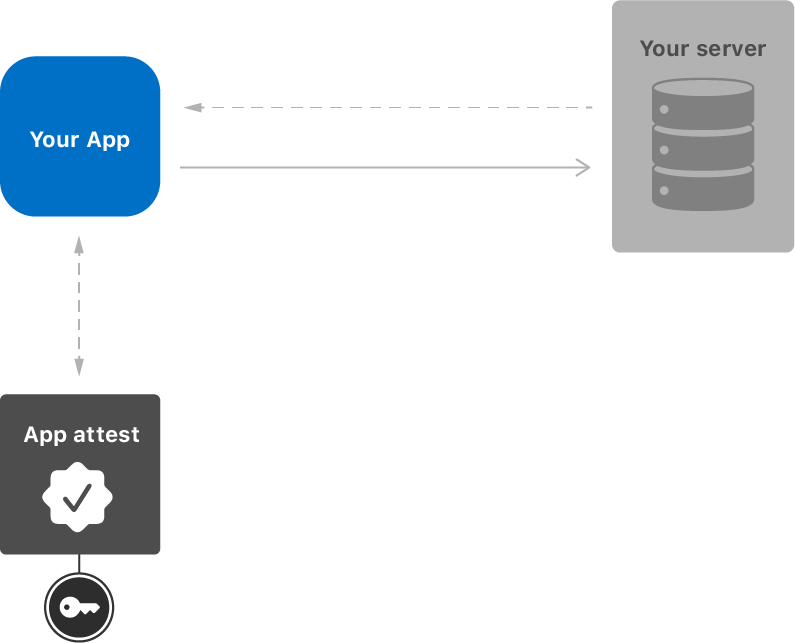As mobile applications increasingly rely on unauthenticated APIs for performance and user experience, the absence of robust security controls creates a soft target for exploitation. Left unprotected, these endpoints can expose sensitive logic and open vectors for abuse—ranging from data leakage to unauthorized system interaction.
Mobile apps commonly rely on unauthenticated APIs for tasks such as retrieving configuration data or serving publicly accessible content. While this approach reduces friction, it also introduces risk. Without proper safeguards, these endpoints become easy targets for misuse. Malicious actors can:
- Generate synthetic traffic to manipulate and/or disrupt backend operations.
- Interact with the APIs from compromised environments—such as emulators, rooted devices, or unauthorized clients—bypassing intended usage boundaries.
FastAPI-Appattest is a lightweight FastAPI extension that integrates Apple’s App Attest, offering a secure and developer-friendly way to validate device integrity. Designed for minimal overhead and seamless integration, it adds a critical layer of trust to unauthenticated mobile API traffic—without complicating your stack.
-
🔐 Apple App Attest Integration
Securely validates requests from your genuine iOS app using Apple’s App Attest — no more trusting just User-Agents or public tokens. -
🧾 Challenge–Response Flow
Implements a secure challenge mechanism to prevent replay attacks and validate device ownership with a time-limited, per-device challenge. -
✅ Signed Session Tokens
Issues short-lived JWT tokens to attested clients — tokens are cryptographically signed and tamper-proof. -
⏱️ One-Time Validation per Device/Session
Attestation is performed only once per session or device; future requests just use the lightweight session token. -
🚫 Tamper-Proof Assurance
Clients cannot spoof or forge tokens — the signature must match Apple's public key and challenge. -
🔄 Session Expiry & Rotation
Expiring tokens reduces the attack surface, and tokens can be revoked or rotated as needed. -
🧱 Lightweight & Modular
Drop-in FastAPI extension — no heavy frameworks, easily integrates into any app structure. -
🧠 In-Memory Store with Redis-Ready Design
Uses an in-memory challenge store by default, with a clear path to swap in Redis for production use. -
🌐 Built-in Public Key Caching
Efficiently fetches and caches Apple’s public keys to validate tokens without excessive network requests. -
🧪 Example Project Included
Comes with a plug-and-play example showcasing the full attestation flow from client to protected route. -
📦 Configurable & Developer Friendly
Environment-based configuration with sensible defaults usingpydantic-settings.
# Install via PyPI
pip install fastapi-appattestAn end-to-end working example is included under example/ showing:
- How to generate a challenge
- How to verify the attestation token
- How to issue + consume signed session tokens
👉 See example/README.md for details →
Clone the repo and install dependencies with Poetry:
git clone https://github.com/0x48piraj/fastapi-appattest.git
cd fastapi-appattest
poetry installRun the example server:
cd example/
poetry run uvicorn main:app --reloadAfter installing fastapi-appattest, you can secure your unauthenticated mobile API endpoints in just a few steps.
from fastapi import FastAPI, Depends
from fastapi_appattest import get_current_session, appattest_router
app = FastAPI()
# Mount attestation endpoints at `/device/*`
app.include_router(appattest_router, prefix="/device")This automatically sets up:
GET /device/challenge?device_id=...– generate a challengePOST /device/attest– verify the token and issue a session token
Secure any endpoint by requiring a valid attested session token:
@app.get("/api/config")
def get_config(session=Depends(get_current_session)):
return {
"device": session["device_id"],
"config": {
"feature_flags": ["app_default_config", "dark_mode"],
"min_supported_version": "1.0.0",
},
}If the client does not present a valid token:
- Request is rejected
- No extra code needed — validation is handled by
get_current_session
APPLE_PUBLIC_KEYS_URL=https://apple-public-keys-url
APP_BUNDLE_ID=com.your.app.bundleid
CHALLENGE_EXPIRY_SECONDS=300
JWT_SECRET=your-secret-signing-key
JWT_EXPIRY_SECONDS=1800Or set them directly via pydantic-settings.
-
Client requests a challenge:
GET /device/challenge?device_id=... -
App performs attestation on-device using the challenge
-
App sends the attestation payload to the server:
POST /device/attestwith:{ "token": "<apple_signed_attestation_token>", "challenge": "<challenge_from_step_1>", "device_id": "<unique_device_id>" } -
Server verifies and returns a
session_token -
Client includes this token in future requests:
Authorization: Bearer <session_token>
Star (⭐) the repository and consider following me on GitHub if this project saved you time or taught you something.
- Add IP address / user-agent binding to session tokens
- Store active tokens in Redis with revocation support
- Use short-lived JWTs + refresh token flow
- Log suspicious token re-use or mismatched device claims
- Integrate Google's Play Integrity API (???)
